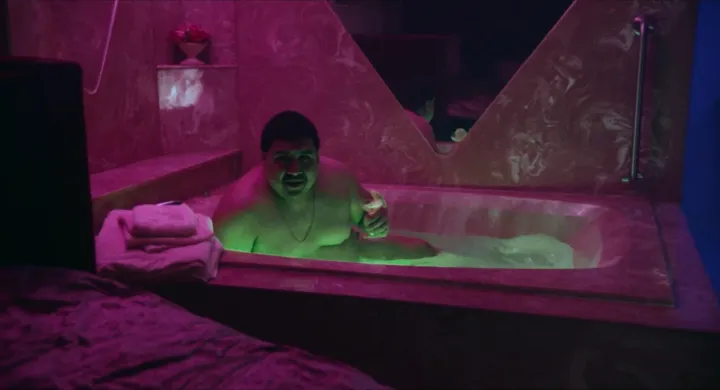Admittedly, I have no idea how to describe what I witnessed in All Jacked Up and Full of Worms. The film depicts the adventures of Roscoe, a janitor at a motel “whose girlfriend has brought another man home for strange rituals,” and Benny, a peculiar man “trying to manifest a baby from an inanimate sex doll.” When the duo ingests hallucinogenic worms, all hell breaks loose as Roscoe and Benny spiral out of control on their drug-infused bender.
After speaking with writer/director Alex Phillips, I gained a better understanding as to why he constructed a transgressive horror that will divide audiences. As he says below, “If you’re making a no-budget film and you are beholden to no one, why not be more adventurous with it? Take a bigger swing and a bigger risk.” In a landscape where intellectual property and franchises dominate, filmmakers like Phillips are taking a different route, telling original and polarizing stories on their terms. As much as I struggled to understand the plot, I commend Phillips for crafting a story that caused me to think and react well after the film ended.
In an interview with Digital Trends, Phillips explains his use of psychosis, touches on the moral ambiguity of the characters, and selects the best movie ever set in Chicago.

Note: This interview has been edited for length and clarity.
Digital Trends: How did you settle on worms as the hallucinogen? Was any other insect or animal in the running?
Alex Phillips: No, it was always worms. It always felt right to me. I like that they’re so ubiquitous, and they exist under our feet. I think they’re kind of a good metaphor for a cycle of life and all that stuff. It has a poetic reason, but also, they’re so wet and squiggly and biological. I say “biological,” but I don’t mean it in any scientific way. I didn’t do well in biology.
Same here.
[Laughs] But they seem like they could exist in your body as an organ.
I read this story as your take on psychosis because you’ve experienced it in your life. What was the main theme you tried to incorporate from your experience into the film?
Yeah, you took the words out of my mouth. The main theme to me, at least in one word, would be psychosis. But, I wanted it to be less from a psychological realism of storytelling because I didn’t think that was honest about the experience of psychosis.
I also think there are a lot of movies that are pretty adventurous with their storytelling, and I feel like if you’re making a no-budget film and you are beholden to no one, why not be more adventurous with it? Take a bigger swing and a bigger risk. Psychosis, but then also, trying to tell a story in its own voice and own form, which is a pretty big risk, because the most successful people at that are the best.

There were a lot of challenges after the film was shut down during the pandemic. I read that you went back and had to change some scenes and rewrite things. Now that it’s complete, do you think you’ve made a better film than what you originally wrote, or are there things you wish you could have carried over from the original version?
Yeah, I mean it was cool because … Well, the pandemic, none of it was cool.
Agreed.
[Laughs] It introduced like a million problems for the movie, and the only way to solve them was with a creative solution. That sort of made every single problem that arose another layer of care that went into the film. Before the pandemic, everyone was really passionate to finish the film, and then when the pandemic happened, it made finishing it more vital.
It was like, “Well, we have to do this. We have no other thing to focus on right now.” With that in mind, it made the movie definitely what it is now. I try not to think if it would be better or worse just because it happened, and it exists in the only way that it could.
Many characters are doing bad things, but I don’t know if they’re necessarily bad people, especially Roscoe and Benny. How did you view these characters? Are they morally good but under the influence of the worms, or are they in a gray area?
Well, they’re definitely doing bad stuff. That’s for sure. [Laughs] I guess I don’t know. I think that a lot of movies right now are very morally obvious. Instead of me passing judgment or making it easy for an audience to pass judgment on these people doing bad stuff, I thought it would be more interesting and more empathetic to all of humanity if we can recognize ourselves in characters that are doing bad stuff. Not to excuse the baby doll because that’s obviously gross and not a good thing, but I think it would be really easy to make Benny a bad guy.
I know Trevor Dawkins, who plays Benny Boom. He’s an extremely charismatic person. I think it’s more complicated and challenges viewers and takes us on more of an arc for him if we recognize ourselves in him. We have to grapple with him [and] this thing that we absolutely don’t want to go to. But that’s kind of what the point of a horror movie even is, you know.
Did that affect some of the actors’ decisions on how to play each character? They are morally complicated and ambiguous. They’re not good guys or bad guys.
Yeah. All those scenes and all the dialogue turn it all into less of a static idea and more like a process of feeling around. To me, it makes the movie more dynamic or active. There was a moment when the first time we were shooting the scene with Benny and he was opening up his package to pull out the baby, there was a back and forth between Trevor and me to figure out what was going on here.
I think his impulse was to make it evil. Instead, it was like, “No, let’s make him like he’s learning about himself with us.”
While staring at this baby with a huge mouth.
[Laughs] Yeah.
You oversaw a lot of the special effects on the film. I know you worked with Ben [Gojer] on the puppets and all the worm effects. What special effect was the most difficult to create?
I wouldn’t want to take away from any of Ben’s expertise because he’s really mastered this stuff over time. We’ve worked together for a really long time so it was really cool to see him grow. To me, he’s the best that I could ever work with to make this stuff. Working with him, I would come up with this hare-brained idea in the script, and it’s obviously a huge ask.
Basically, the whole script is a huge ask of every actor. Also for Ben, I would write in all these effects. Then, it became a process of figuring it out because we have limited time and limited days in figuring out what is vital to the story. Everything was, but it was figuring out how to tell the same scene, but cut back and pick the right stuff.
It was cool to go into the workshop. There were really long nights where we were filling up hundred-foot hoses with worms and goo. Also, [while] working on the choreography of the cocoon thing at the very end, we were talking about how to shoot this and stuff. A lot of my input was trying to figure out how the coverage would work and how to cut together like a mask transforming from one moment to the next. Try to work with Ben to say, “OK, we should have these steps so that there’s a progression of how these things work.”

What was the idea behind the religious speaker on the television in the motel? I felt like I was being hypnotized and fed with propaganda.
Yeah, that’s kind of what he’s there for. I had more backstory for him, but I cut away at it, and it became just an extra layer of the dream. There’s a larger worm conspiracy out there, and he’s representative of it. This motel is almost like a wormy dream.
Since this movie is based in Chicago, what is your favorite movie set in Chicago? There are so many to pick from, so you can name a few.
Oh, man. That’s great. That’s a really good question. My brain immediately went to Henry: Portrait of a Serial Killer or Thief.
I had Thief on my list. I’ve been getting into Michael Mann and revisiting his films. I’m like, “This guy’s still got his fastball.”
Have you seen Manhunter? That one doesn’t get enough love.
Yes. It essentially created The Silence of the Lambs.
Yeah. It’s his weirdest one. Also, I live a block away from The Green Mill. During the climax-ish montage, it’s one of the dive bars they blow up. Whenever that happens, I’m like,” Yeah, Chicago!” [Laughs]
All Jacked Up and Full of Worms is available to stream on Screambox.
Editors' Recommendations
- Oscar-winning Everything Everywhere All at Once directors on creating 2022’s most moving sci-fi film
- Slash/Back director talks homegrown horror and the film’s amazing score
- Taylor Swift on making All Too Well, her favorite movies, and her future as a director




